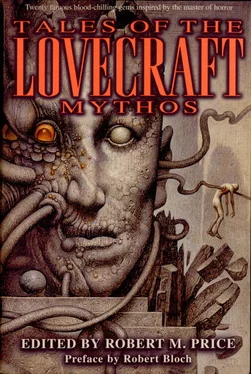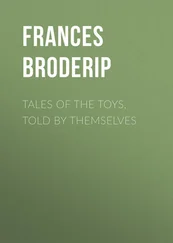“I seem to remember,” said Edith Halbin, “some unpleasantness connected with his name….”
Lucius Bates nodded. “That would be about his brother, Edmund. For years, there was bad feeling between the two men. It reached a climax when Edmund publicly accused Horatio of falsifying reports as to the depths he had reached in the diving bell. But they must have patched up their differences, for they continued to live here together — until one day Edmund left.”
“Where did he go?”
“I don’t really know. Horatio wasn’t sure either, though he said something about his brother having interests in Haiti.”
“Is this all of Horatio’s shell collection?” asked Edith Halbin, nodding toward the tank.
Bates shook his head. “No, but for some reason, he destroyed most of it before his death. He suffered a heart attack, you know, while fitting that cover on the aquarium.”
Next day, by means of hard, if unskillful work, Miss Rhodes managed to get the frozen valves into operation. She drained the tank and when it was emptied saw that the bottom was made up of a thick layer of greyish sand upon which the shells rested or were partially buried.
While the tank was refilling, she turned her attention to the library desk and came upon a drawer she had not opened before. Here were several file folders with the name, Horatio Lear, stamped upon them. One contained a chart labeled Caribbean Area, Subdivision: Senarbin Deep. There were other charts, many of them illustrated with pen and ink drawings of marine shell life.
As Miss Rhodes looked through these papers, a desire to know more about the subject seized her. Across the room in a tiny alcove off the library proper Kuching, the Siamese, lay on a pillow, surrounded by her kittens, and watched through slitted eyes. Presumably, the alcove had been built for bookbinding, cataloguing, and other related tasks, but when Edith had seen it, she decided it was the place for her pet.
By carefully comparing some of the smaller shells from the tank with the illustrations on the charts, Miss Rhodes was able to catalogue a dozen or more specimens including a rare bluish Stimpson’s Colus, a deep water Solariella obscura, an albino Queen Conch and a Caribbean Vase.
Then she began to read from a typewritten paper which she found in another file folder. The manuscript seemed to be a hodgepodge of deep water scientific observations and autobiographical remarks. As she continued to read, a feeling of detachment and unease slowly stole over her. Her first impression was that Lear had been a very erudite man, completely absorbed in his work. But when she came upon several vitriolic notations concerning his brother, Edmund, her admiration changed to a feeling of repugnance.
Miss Rhodes went to bed that night, her head filled with unpleasant thoughts. What sort of man was this, who was so obsessed with anger for his own kin that he would violate the ethics of his profession by baring his soul in a paper ostensibly devoted to science? Moreover, his hatred seemed to have no greater motive than Edmund’s refusal to accept Horatio’s theory concerning some forms of deep marine life. What that theory was, was not explained.
Miss Rhodes tossed restlessly, finally dozed off. About two in the morning something awakened her.
The noises of the spring night drifted in her open window.
Then she became aware of a distant mewing, coming from the lower floor. She got up, put on a robe and slippers, and descended the staircase. At the library door, she clicked on the light switch and entered the room.
Directly before her stood Kuching, her back arched, her tail stiffened, her head lifted upward. Even as she watched, the cat began to move forward like a creature in slow motion.
“Kuching!” called Miss Rhodes softly.
The Siamese swung and hissed, then turned uncertainly and headed for the pillow in the alcove. Miss Rhodes followed and bent down. Only three kittens were there. The fourth was missing.
She was in the midst of a search of the room when Edith Halbin entered.
“I thought I heard something,” she said. “What’s wrong?”
“One of the kittens is missing,” replied Miss Rhodes. “It must be around here somewhere.”
But a complete investigation of the room failed to reveal the animal. Then Edith Halbin pointed to one of the small, open windows above the wall book shelves. Her voice betrayed her shock and dismay.
“Something must have come in there and carried it off. Poor Kuching!”
Miss Rhodes followed her gaze and her lips tightened. For some reason, she did not tell her friend that height made entrance or exit by the window impossible; nor did she show her what she saw now by the table midway across the room — the horrible tuft of blood-clotted fur, almost invisible in the shadows against the dark of the floor.
Next day, the two women embarked on a project which they hoped would lighten the mood into which they had both lapsed — the painting of Edith Halbin’s portrait. Miss Rhodes, genuinely concerned about her friend, reasoned that sitting for a picture would at least take her away from Horatio Lear’s book collection, for which the Bristol girl had displayed a strange and unhealthy interest.
To Miss Rhodes, everything about the collection was unhealthy — from the ancient mouldering covers to the quasi-factual, half mystical content, steeped in folklore and superstition. There was, for example, a copy of Gantley’s Hydrophinnae , containing some of the most hideous and horrible illustrations she had ever seen. There was a first edition of Dwellers in the Depths by Gaston Le Fe who, the foreword stated quite blandly, had died insane. And there was a pirated manuscript of the German Unter Zee Kulten , all copies of which had supposedly been destroyed in the seventeenth century.
It was the cumulative effect these books had upon Edith Halbin that worried Miss Rhodes. She herself had spent an hour with the volumes, and had come away all but overwhelmed with loathing and shattered nerves.
But perhaps the portrait would change all that….
Against her better judgement, Miss Rhodes consented to Edith’s request that she do the portrait against the background of the aquarium. Try though she would, however, to keep the likeness of the container of shells subdued, it persisted, by some trick of pigment or brush stroke, in standing forth in parallel importance to the figure in the painting.
Moreover, the effect of water in the tank was not at all realistic. A heavy shadow was concentrated here which no amount of reworking seemed able to lighten.
After two weeks, the portrait was done. Seeking relief from the finished task, Miss Rhodes strolled into the little yard behind the house, unmindful of the mizzling rain that dripped from a leaden sky. Presently, she became aware of a man on a stepladder on the adjoining property. It was Lucius Bates. She crossed over and bade him good morning.
“But a wet, gloomy one,” he said, resting his saw in the branch of the plane tree he had been trimming. “It seems one bad day follows another.”
They exchanged idle talk. “You still haven’t got rid of that stone monstrosity, I see,” he said.
“Monstros? Oh, you mean the aquarium! But why…?”
Bates adjusted his oversized spectacles. “You have a rather nice library. That oversized tank is out of taste. I’ve often wondered why Horatio put it there in the first place.”
“Presumably because it was close to his place of work.” “Fiddlesticks! I should think a dry table would have been as good a place to keep his shell specimens on. But then, Horatio was a little touched.”
Miss Rhodes was going to mention Lear’s queer papers and books when she thought better of it. Instead she said, “In what way — touched, I mean?”
Читать дальше












